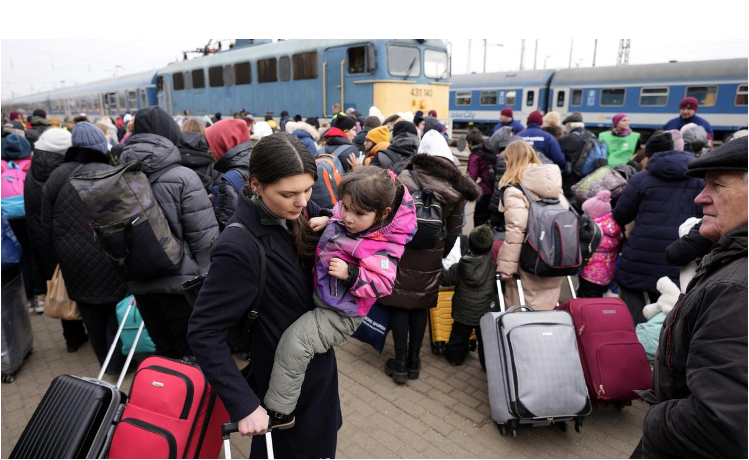CommentsTRANSPO - Ukrainians, terrified, worried, hungry, cold, with very uncertain futures, are fleeing their country to escape the bloody war of Putin.
Ukrainian hospitals, schools, apartment buildings, and other places of civilian life are targeted for maximum mayhem, terror and death from Putin and his military.
Nearly two million Ukrainians have fled, and more will be fleeing to countries surrounding Ukraine. Any mode of transportation is used, car, bus, foot, boat, and train, to escape the madness, brutality and death of the Putin war machine.
While watching news footage of the unfolding humanitarian crisis, and seeing people escaping to trains stations to ride trains to safety, it soon becomes obvious that they are traveling by the standard two-rail heavy trains, and not by monorail.
In no way am I trying to lessen or trivialize the immense sufferings of the Ukrainian people by comparing the use of train types to transport people to safety, but to illustrate the obvious, particularly in light of Metro’s Sepulveda Corridor project, it seems monorail is not up to the needs of not only every day transit life, but is not used in the most dire of circumstances, great emergencies, and threats to humanity.
The latest United Nations report on the impacts and consequences of global warming, LINK, clearly and starkly lays out the threats of climate change, and lists the sources of greenhouse gases causing the warming of the planet.
Transportation is one of the leading sources of carbon gases, including trains. Other culprits are the obvious: cars, trucks and planes. But when factored in that trains carry many people per trip as opposed to individuals in cars or trucks, trains (and buses) produce per passenger less carbon gases. Passenger trains are needed to try to slow the ever increasing temperature of the planet.
With the worst air pollution in the nation, Southern California needs to reduce its share of green house gases through its residents driving less. This means leaving the car, SUV, truck at home and riding buses and trains. Yes, electric vehicles can lessen the overall release of carbon gases, but the complete overhaul of the driving fleet to electric will take decades, and as the United Nations clearly and dramatically states, we do not have time to waste.
To most quickly achieve a reduction of driving means leaving the car, SUV or truck parked and riding buses and trains. This is where the Metro Sepulveda Corridor project is so critically important. To be built to alleviate the gridlocked 405 Freeway through the Sepulveda Pass serving the San Fernando Valley, UCLA and West Los Angeles, and with transfers to other places in the city, this project began with usual concept of either light rail, or a heavy rail subway, both use two rail tracks.
Somehow, and after first announcements of the project, the concept of a monorail instead was added. This is the only Metro rail project to consider monorail. Why?
The first railroad with two tracks was built in 1804 using James Watts stationery steam engine. It changed the world of transportation and has been the standard worldwide since.
Monorail is considered to be created in 1820, so its history is nearly as deep. Yet, nations throughout the world have overwhelmingly chosen two rail trains as the mainstay for passenger and commercial rail.
Rail networks, such as Metro’s in Los Angeles, work best when the network is comprised of the same type of train, which is two rail/heavy rail. Why introduce a foreign, stand alone system into the network which would add unneeded complexity?
In the history of Metro building rail lines, subways and light rail, why was the Sepulveda Corridor the only Metro project chosen as a monorail experiment? The two competing types of trains for the project both received payment from Metro of around $60Million to develop plans, with no decision until 2024. This is too late, building needs to begin now. Why is public money used on the monorail proposal when worldwide the standard has been, and remains two rail trains?
The people of Ukraine are desperately fleeing for their lives and being evacuated by two rail trains which continue to operate in dire situations and successfully move people in very crowded train cars. There is no monorail in sight. Could it be monorail is not up the the needs? So why should Los Angeles even consider monorail for the Sepulveda Corridor Project?
(Matthew Hetz is a Los Angeles native. He is a transit rider and advocate, a composer, music instructor, and member and President and Executive Director of the Culver City Symphony Orchestra.)
















